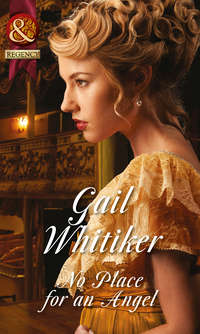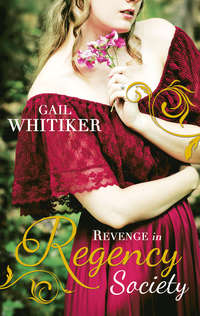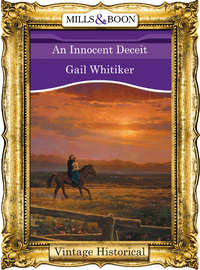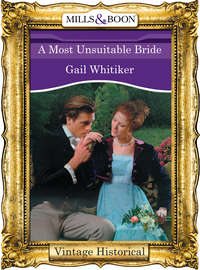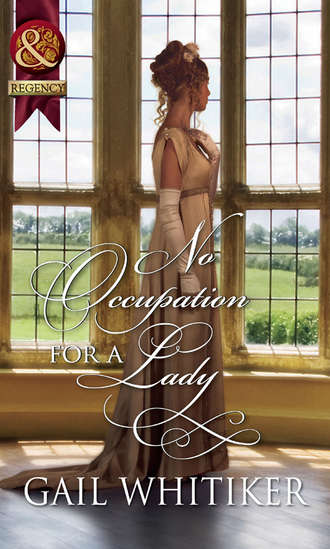
Полная версия
No Occupation For A Lady

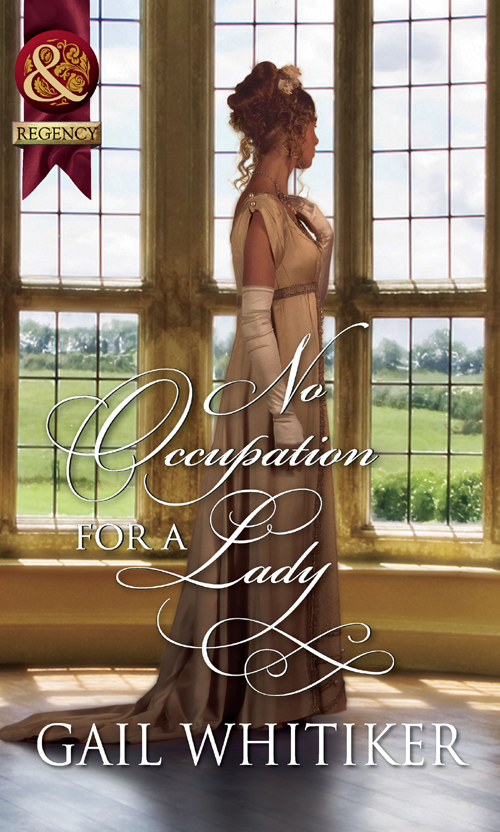
‘Mr Devlin—’
‘Alistair,’ he whispered.
‘Mr Devlin,’ Victoria repeated, closing her eyes. ‘I beg you to listen to me—’
‘I don’t want to listen,’ he said, drawing close.
‘I want … this.’
And then … he kissed her.
Victoria had been kissed before; once by a fumbling youth in a childhood game and once by a friend in a Christmas theatrical. But she had never been kissed like this. Never been made to feel as though she was in danger of losing her mind. The searing heat of Alistair’s mouth obliterated every rational thought, and for a moment she didn’t care that she must tell him a potentially damaging truth.
All she knew was that she was falling in love with Alistair Devlin. Whatever happened tomorrow would have no bearing on that.
Slowly, reluctantly, they drew apart, their eyes holding each other’s in the dim evening light. Victoria hadn’t known it was possible to feel like this, but she did know that things would never be the same between them again. Soon she would have to tell him the truth. Soon she would have to explain why this secret life had been imposed on her. But in the aftermath of his kiss all she wanted to do was draw his head down to hers and kiss him again …
About the Author
GAIL WHITIKER was born on the west coast of Wales and moved to Canada at an early age. Though she grew up reading everything from John Wyndham to Victoria Holt, frequent trips back to Wales inspired a fascination with castles and history, so it wasn’t surprising that her first published book was set in Regency England. Now an award-winning author of both historical and contemporary novels, Gail lives on Vancouver Island, where she continues to indulge her fascination with the past as well as enjoying travel, music and spectacular scenery. Visit Gail at www.gailwhitiker.com
Previous novels by this author:
A MOST IMPROPER PROPOSAL* THE GUARDIAN’S DILEMMA* A SCANDALOUS COURTSHIP A MOST UNSUITABLE BRIDE A PROMISE TO RETURN COURTING MISS VALLOIS BRUSHED BY SCANDAL IMPROPER MISS DARLING
*part of The Steepwood Scandal mini-series
Did you know that some of these novels are also available as eBooks? Visit www.millsandboon.co.uk
AUTHOR NOTE
The theatre has always been a popular form of entertainment, and it was well attended during the Georgian and Victorian periods. Jane Austen frequently went to performances at Drury Lane and Covent Garden when she was in town, and many a notable actor and actress rose to fame during this period. To others, however, it was a breeding ground for sin and corruption.
NO OCCUPATION FOR A LADY was born out of a single question. What might a gently bred lady do that was not entirely respectable and not widely approved of by society? The answer? Almost anything to do with the theatre—so naturally my heroine had to become deeply albeit secretly involved with the writing and production of plays.
This meant I needed an aristocratic hero who was not an avid theatregoer, who despised deception in all forms, and whose own interests were as far removed from the frivolous world of the theatre as possible. Throw in an eccentric uncle who owns a theatre, a mother who thinks it’s the devil’s playground and a brother who hates the spotlight and you have the makings of a family disaster—and, hopefully, of a compelling love story.
I hope you enjoy this light-hearted romp through the world of Regency theatre!
Author’s Note
The Licensing Act of 1737 introduced the heavy hand of censorship to the British theatre. It was initiated by Robert Walpole, one of the period’s most influential and powerful men, and its main purpose was to prevent satirists of the day from lampooning politicians—Walpole in particular—and from presenting anything felt to be subversive or distasteful to the British public. As such, it required that a Lord Chamberlain and his ‘Examiners of Plays’ approve every play prior to its first public performance. Any content deemed to be insulting, derogatory, inflammatory or controversial was removed.
The Act also restricted the production of serious dramatic works to Drury Lane and Covent Garden, two theatres already in possession of royal sanctions. Theatres that did not hold this distinction—like the fictitious Gryphon—resorted to producing melodramas, ballad operas and burlesques, which relied heavily on musical interludes, facial gestures and body movements, and either eliminated or restricted the use of spoken dialogue altogether.
The scope of the Licensing Act caused a resurgence in the works of William Shakespeare, given that plays written before 1737 were not subject to censorship and could be performed without permission from authority, but it also fostered a deep distrust of government officials by both playwrights and the public alike. As a result, many successful playwrights turned their hand to writing novels, which were not affected by the same strict rules. Surprisingly, the Act remained in effect until 1968, when it came up against mounting pressure from influential anti-censorship groups.
I have taken a certain amount of artistic licence with regard to the content of Victoria Bretton’s plays. I tend to think her remarks about members of society and the clergy would probably have been ‘red lined’ by the Examiners, but for the sake of the story, I wanted there to be some ‘controversial elements’ in her work. And while it is true that a number of women were successful in writing plays in and around the Regency, it was still not a recommended occupation for young ladies. Oh, how far we’ve come!
No Occupation
for a Lady
Gail Whitiker

www.millsandboon.co.uk
Chapter One
It was important that one dressed appropriately for the theatre, if for no other reason than to spare oneself the embarrassment of being under-dressed should someone of consequence happen to be seated in the box next to you. After all, one never knew when a marriageable viscount or an eligible earl might wander in for an evening’s performance, and with so many single young women looking to find husbands, a girl couldn’t afford to miss a single opportunity.
That, at least, was the justification Mrs Bretton had always given her two daughters for looking their best, and as Victoria Bretton studied her reflection in the cheval glass, she supposed it was not a bad way for an ambitious mother to think. The importance of presenting unwed daughters in the most favourable light possible could not be understated, whether it be at a musicale evening, a grand ball, or at the début of a new play at the elegant Gryphon Theatre, even if only Victoria thought the latter an occasion worthy of attending.
Fortunately, what she saw in the glass was enough to reassure her that it would not be her appearance that fell short of expectation that evening. Her gown of imported ivory silk was in the first state of fashion, and the exquisite pearl-and-ruby necklace lent to her by her aunt served as the perfect accessory. The flashing crimson stones nestled sweetly in the décolletage of her gown, which, as Aunt Tandy had pointed out, was neither too demure nor too daring, and her hair, once likened to the colour of clover honey, had been swept up and arranged in a most sophisticated style by the skilled hands of her aunt’s French maid. She looked every inch the proper young lady society expected her to be.
What would they say, Victoria mused as she turned away from the glass, if they knew what this evening was really all about?
The house was quiet as she made her way down the long curving staircase to the black-and-white-tiled hall. Candles flickered brightly from wall sconces and chandeliers, casting a warm golden glow over the elegant furnishings, while portraits of long-dead aristocrats stared down at her, their critical expressions seeming to offer silent disapproval of her plans.
Victoria paid them no mind. Her concern was with the living, not with the dead.
Besides, they were not portraits of her ancestors. The paintings, like the house, belonged to her father’s brother and wife, an eccentric pair of retired actors who owned a theatre as well as several houses in and around London. They had kindly allowed Victoria’s parents the use of this house for the past two Seasons so that Victoria and her younger sister could make their entrance into society. Victoria had taken her bows last year, and with Winifred doing so this year Mrs Bretton was hopeful that at least one of her girls would end up married by the end of it.
The prospect of returning home to Kent with two unwed daughters in tow was simply too humiliating to be borne.
‘Good evening, Miss Bretton.’ The butler greeted her at the door. ‘James has the carriage ready. Your brother has already gone out.’
‘Thank you, Quince.’ Victoria turned to allow the elderly gentleman to settle a velvet cape about her shoulders. ‘Do you know where my parents and sister are dining this evening?’
‘I believe with Sir Roger and Lady Fulton, miss.’
Ah, yes, the baronet and his wife—a prominent society couple with two sons of marriageable age, the eldest of which Winifred was hopeful of attracting. She certainly wouldn’t pass up an opportunity to spend time with him for something as trivial as a night at the theatre.
After all, what was the opening night of Valentine Lawe’s newest play when compared to the prospect of batting eyelashes at Mr Henry Fulton over the silver epergne?
‘Thank you, Quince,’ Victoria said, careful not to betray even a twinge of disappointment. ‘Goodnight.’
‘Goodnight, miss. Oh, and your father asked me to wish you … a very successful evening. He said you would know what he meant.’
Victoria smiled. A few simple words, as enigmatic as they were brief, and her spirits rose immeasurably. Dearest Papa. Always her ally, even in this. She thanked the butler and walked out into the cool evening air. The late April day had been unusually warm, but the evening temperatures had begun to drop as soon as the sun went down, making her grateful for the enveloping warmth of the cape.
‘Evening, Miss Bretton,’ the coachman said respectfully.
‘Good evening, James.’ Victoria smiled as the under-coachman helped her into the carriage. They didn’t have an under-coachman at home in Kent. There they functioned with only a cook, two maids, a kitchen helper and a good-natured fellow who served as both footman and groom. If they had to get anywhere, they either walked or used the gig. It was only since coming to London that Victoria had been exposed to such luxuries as personal maids and closed carriages, and the one into which she stepped now was sumptuous in the extreme. The interior was lit by the glow of two small lamps, the walls were lined with maroon silk festooned with gold tassels and the cushions were of plush maroon velvet.
Her brother was already seated inside reading a book. Laurence was a fine-looking fellow, or could have been if he made more of an effort. His jacket of dark-blue superfine over a plain white waistcoat didn’t fit quite as well as it had last year and his thick, wavy hair was dishevelled, giving him an appearance of rumpled affability. Wire-rimmed spectacles perched on the end of a very handsome nose and he had a smudge of what looked like ink on his thumb.
‘Let me guess,’ Victoria said as she sat down across from him. ‘White’s Observations on Certain Antiquities, or Norden’s Travels in Egypt and Nubia?’
‘Neither,’ Laurence said, dutifully setting the book aside. ‘A recently acquired copy of Sa-vary’s Letters on Egypt. I thought it would make for some light reading on the way to the theatre.’ He took off his spectacles and placed them on top of the book. ‘What about you? All ready for what lies ahead?’
‘I suppose, though I confess to being hideously nervous,’ Victoria confided. ‘What if no one comes?’
‘Of course people will come. Uncle Theo expects the theatre to be sold out.’
‘Uncle Theo is an optimist.’
‘No, Uncle Theo is a man who knows his business,’ Laurence said calmly. ‘He should, given the number of years he’s been at it. And experience has shown that Valentine Lawe’s plays always do well.’
Victoria settled back against the velvet squabs and wished she could feel as confident as her brother. While it was true that all three of Lawe’s previous plays had met with critical acclaim, that wasn’t to say that any of his future works would be guaranteed the same high level of success. The theatre-going public was notoriously fickle. What pleased them one day offended them the next and, given the decidedly satirical nature of Lawe’s plays, it was quite possible some prominently placed personage, believing himself to be the butt of Lawe’s wit, would take exception to the humour and proclaim his disapproval to anyone who would listen.
Still, there was nothing to be done about it now. In less than thirty minutes the curtain would rise and A Lady’s Choice would make its début. The best anyone could hope for was that Laurence was right and that their uncle knew what he was talking about.
As usual, traffic in the city was dreadful—an endless stream of hackneys, barouches, tilburys and phaetons trundling over the cobblestones en route to their various evening pleasures. Victoria saw long line-ups of carriages outside several of the large houses in Mayfair and felt a moment’s relief that her destination was not a grand house this evening, but the Gryphon, London’s newest and most elegant theatre. Once a rundown warehouse, the old building had been extensively refurbished and was now filled with a small fortune in Italian marble, Venetian glass, and brocades and silks direct from the Far East. The seating was roomier and the boxes grander than at any other theatre in the city and the frescoes on the ceiling were said to have been painted by a descendant of Michelangelo himself.
As to the nature of entertainments provided, the Gryphon was not licensed to present legitimate drama, so had to settle for a variety of works ranging from comic operettas to the occasional burlesque. In the relatively short time it had been open, however, it had gained a reputation for providing quality entertainment and tonight promised more of that with the début of Valentine Lawe’s newest play. Rumour had it that Sir Michael Loftus, theatre critic for the Morning Chronicle, was going to be in the audience, and Sir Michael’s stamp of approval was as good as God’s when it came to anything to do with the stage.
That, at least, was what her uncle had told her and, given his vast experience in the theatre, Victoria knew better than to doubt him.
Finally, the carriage rounded the last corner and the Gryphon came into view, a glorious, towering edifice that shone white against the darkening sky. Victoria caught her breath just looking at it. And what a crowd! Judging by the line up of barouches and landaus slowly making their way along the street, a goodly portion of society had come out for the opening.
‘Almost there, Tory,’ Laurence said as the carriage turned down the lane that ran alongside the theatre.
Victoria pressed a gloved hand to her chest and closed her eyes. ‘I can’t go in, Laurie.’
‘Of course you can. Aunt Tandy and I will be waiting for you in the box and the play will be a smashing success. Uncle Theo said as much after the last rehearsal and you know he wouldn’t lie.’
No, he wouldn’t, because her uncle knew better than to offer false assurances when so much was at stake. Opening night was the first time eyes other than those of the cast and crew would be seeing the play and how the audience responded tonight would be a strong indicator of how long the play would run, how much money it would make, and what kind of effect it would have on the playwright’s future.
A bad opening night could herald more than just an early end to a play’s run. It could sound the death knell on a playwright’s career.
‘Give my regards to the cast,’ Laurence said as the carriage drew to a halt. ‘Tell Victor I expect a standing ovation, and Miss Chermonde that her performance had better warrant at least three curtain calls.’
‘I’ll tell them,’ Victoria said as the door opened and James let down the stairs. ‘Whether they heed you or not is another matter all together.’
And then she was alone. Standing in the street as the carriage pulled away, she took a few deep breaths to compose herself. No doubt the actors inside were doing the same. Stage fright was all part and parcel of opening-night madness, but hopefully by the time the curtain rose, the butterflies would have flown and the cast would have settled into giving the best performances of their lives. The audience would accept no less.
Neither, Victoria thought as she knocked lightly upon the unmarked door, would her uncle.
‘Ah, good evening, Miss Bretton,’ said the elderly gentleman who opened it. ‘I wondered if I’d be seeing you tonight.’
‘Good evening, Tommy. I thought to have a word with my uncle before the performance began. Is everything ready?’
‘Aye, miss, as ready as it will ever be.’ Thomas Belkins stepped back to let her enter. ‘Had some trouble with the backdrop for the second act, but we got that straightened away, and Mrs Beckett was able to mend the tear in Mr Trumphani’s costume neat as ninepence.’
‘What about Mrs Roberts?’ Victoria asked. ‘Is she feeling better than she was at rehearsal?’
‘Haven’t heard her complain, but between you and me, she’s a tough old bird who nothing short of death would keep from being on stage on opening night.’
The old man’s cheerfulness did much to settle Victoria’s nerves. Tommy Belkins had been in the theatre all of his life. Once an actor with a travelling Shakespearean troupe, he now worked behind the scenes at the Gryphon, overseeing the elaborate systems of lights, ropes, pulleys and reflectors that created the magic on stage. Both Drury Lane and Covent Garden had tried to lure him away, but Tommy had refused their offers, saying he’d rather work for pennies at the Gryphon than for a grand salary anywhere else.
Not that he did, of course. Her uncle paid a generous wage to all of the people who worked for him. It was one of the reasons the productions staged at the Gryphon were so good. He encouraged a spirit of co-operation and conviviality unusual in the theatrical world, and because Theodore Templeton was known for giving promising young actors a chance, he never found himself short of talent.
Still, in the end, it all came down to the quality of the play, and, knowing it was too late to do anything about that now, Victoria closed her eyes and whispered a silent prayer to St Gen-esius. It might just be superstition on her part, but she never ventured into a theatre without asking the patron saint of actors for his blessing.
Then, with both her brother’s and Tommy Belkins’s good wishes ringing in her ears, Victoria Bretton—alias Valentine Lawe—walked into the theatre and prepared to face whatever the Fates held in store for her.
The Honourable Alistair Devlin did not make a habit of going to the theatre. It was all right if no other more amusing pastime could be found, but given the choice between watching amateurish productions staged by men and women who suffered from the misguided notion that they could act, or spending the evening in the comfortably masculine ambiance of his club, he would always choose the latter. The only reason he had come tonight was to appease his good friend, Lord Collins, whose repeated requests that he come and see the nubile young actress he was intent on making his newest mistress had finally worn Alistair down.
‘And I dare you to say she is not exquisite,’ Collins said as they settled into their gilt-edged seats at the front of the box.
‘I’m sure she will be all you have promised and more,’ Alistair said, gazing with interest at his surroundings. ‘You have always been an arbiter of female loveliness.’ It was the first time Alistair had ventured inside the Gryphon, but not the first time he had heard about the celebrated theatre. Rumour had it that upwards of eighty thousand pounds had been lavished on the building’s restoration and that a special company had been assembled to grace its stage.
According to Collins—who had already enjoyed an intimate liaison with another young actress from the company—it was not enough that an actor be able to recite his lines without stumbling. He must also be able to portray that character’s feelings in such a way that the audience was moved to laughter or tears, without resorting to the facial contortions and physical gestures so often employed by under-talented performers.
Frankly, Alistair was sceptical. While he knew that some actors were talented enough to pull off such masterful performances, experience had shown him that most tended to fall back on the melodramatic posturings that left him entirely unmoved and prompted audiences to hurl both insults and orange peelings at the stage.
‘By the by, did I mention that Signy has a friend?’ Collins asked. ‘Another actress in the company. You might do well to look her up, given that you’re in the market for that sort of thing.’
‘Thank you, Bertie, but I have absolutely no intention of looking for a new mistress,’ Alistair replied, gazing at the magnificent frescoes overhead. ‘The one with whom I just parted gave a new meaning to the word vindictive.’
Collins had the cheek to laugh. ‘Yes, I did hear something about the glorious Celeste managing to knock over two rather expensive vases on her way out of your house.’
‘Expensive? She wilfully destroyed a priceless Tang horse and a Sèvres vase that have been in my family for generations,’ Alistair murmured. ‘Grandmother Wilson still hasn’t forgiven me for that lapse in judgement.’
Unfortunately, it wasn’t only Celeste Fontaine’s wanton destruction of family heirlooms that had prompted Alistair to end his relationship with her. It was the fact she had lied to him. She had told him to his face that he was the only man with whom she was keeping company, when in fact she had been spending as much time in Lord Lansing’s bed as she had in his.
When Alistair had brought this trifling detail to her attention, Celeste had treated him to a performance that would have done the great Sarah Siddons proud. She had stormed out of the house, somehow managing to consign the two pieces of porcelain to their doom on the way, and the next day, had sent him a scathing letter in which she had told him exactly what she thought of his behaviour, adding that while he was an adequate lover, she believed his skills in bed to be highly overrated.
It was the contents of the letter that had hammered the last nail into her coffin. While not an arrogant man, Alistair took pride in his ability to please the opposite sex. As a callow youth, he had discovered that the sexual experience was heightened if both parties were able to enjoy it, and he had striven to learn the secrets of giving pleasure as well as taking it. So to have his skills in bed mocked by a woman who had never once left him in any doubt as to how much she enjoyed them seemed to him the height of hypocrisy.
Still, he’d managed to have the last word. Only last week, the celebrated courtesan had appeared at his door, saying with every appearance of contrition that she was genuinely sorry for the way she had behaved and that it was only in a moment of weakness she had succumbed to Lord Lansing’s advances. At that point, she had batted her eyelashes and, with tears falling from her famous pansy-blue eyes, had begged him to take her back.


